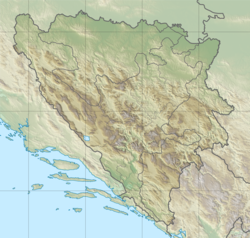This article relies largely or entirely on a single source. (October 2016) |
The Sarajevo Synagogue (Serbo-Croatian: Sinagoga u Sarajevu, Синагога у Сарајеву) is an Orthodox Jewish congregation and synagogue, located on the south bank of the river Miljacka, in Sarajevo, in Bosnia and Herzegovina. The synagogue was constructed in 1902 and is the only functioning synagogue in Sarajevo today. The congregation worships in the Ashkenazi rite.
| Sarajevo Synagogue | |
|---|---|
 The synagogue in 2015 | |
| Religion | |
| Affiliation | Orthodox Judaism |
| Rite | Nusach Ashkenaz |
| Ecclesiastical or organisational status | Synagogue |
| Status | Active |
| Location | |
| Location | Hamdije Kreševljakovića, 59 Quartier de Drvenjia, Sarajevo |
| Country | Bosnia and Herzegovina |
Location of the synagogue in Bosnia and Herzegovina | |
| Geographic coordinates | 43°51′23″N 18°25′30″E / 43.856406822117656°N 18.425116086469778°E |
| Architecture | |
| Architect(s) | Karel Pařík |
| Type | Synagogue architecture |
| Style | Moorish Revival |
| Date established | Late 19th-century |
| Completed | 1902 |
| Dome(s) | 4 |
| Official name | Ashkenazi synagogue, the historic monument |
| Type | Category II cultural property |
| Criteria | A, C iii.iv.v., D iii.iv., E i.ii.iii.iv.v, G iii.vi., H i.ii. |
| Designated | July 6, 2006 (decision No. 07.1-2-126/06-4) |
| Reference no. | 2844 |
| List of National Monuments of Bosnia and Herzegovina | |
History
editThe history of the Jews in Sarajevo dates back over 400 years to 1541 when the first Jewish settlers arrived via Salonika. These early settlers were primarily artisans, merchants, pharmacists, and doctors. In 1577, with permission from Pasha Siavush, they established their own quarter, known as El Cortijo (the courtyard). In 1580, the community, with the assistance of a Turkish benefactor, built a synagogue in El Cortijo within a building called Velika Avlija. By the end of the 16th century, the structure housing Velika Avlija became known as the Old Jewish Cathedral, Sarajevo's first synagogue. The building burned down in both 1679 and 1778, and was rebuilt each time. It now serves as a Jewish museum. Next door is the New Synagogue (Novi Hram) serving as an art gallery owned by the Jewish community of Sarajevo.
Ashkenazi Jews arrived in Sarajevo during the Austro-Hungarian Empire in the late 19th century. The Sarajevo Ashkenazi synagogue was designed by Karel Pařík and built in 1902.
The Sephardic community constructed their own Il Kal Grande synagogue of 1932, acknowledged as the largest and most ornate synagogues in the Balkans. It was devastated by the Nazis in 1941 during World War II, but the Ashkenazi synagogue was able to escape destruction.[1]
The Holocaust in the 1940s and the civil war during the 1990s left fewer than 5,700 Jews in former Yugoslavia. The Jewish community, like the entire country, was once defined by its unique combination of eastern and western traditions. Populations of Sephardi and Ashkenazi Jews peacefully co-existed with their Christian and Muslim neighbors in Sarajevo and elsewhere in Bosnia and Herzegovina.
Architecture
editThe synagogue was designed in the Moorish Revival style, a popular choice for synagogues in the Austro-Hungarian Empire.[citation needed]
The synagogue has enormous arches with richly painted decorations. The high, ornate ceiling was highlighted by a ten-pointed star. Today the synagogue is confined to the women's galleries on the upper floor. At the entrance, a stone menorah commemorates the 400-year anniversary of the Jews in Bosnia and Herzegovina.
The building was renovated in the 2000s.
Gallery
edit-
Interior view
-
The synagogue in 1914 on the banks of the Miljacka
See also
edit- Jews in Bosnia and Herzegovina
- Sarajevo Haggadah
- Il Kal Grande, Sephardi synagogue of Sarajevo
References
edit- ^ "Sarajevo, Bosnia & Herzegovina Jewish History Tour". www.jewishvirtuallibrary.org. Retrieved 21 February 2018.
External links
editMedia related to Sarajevo Synagogue at Wikimedia Commons
